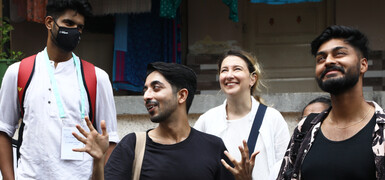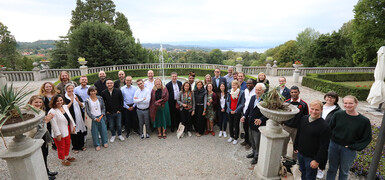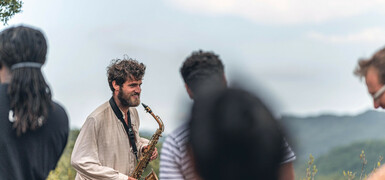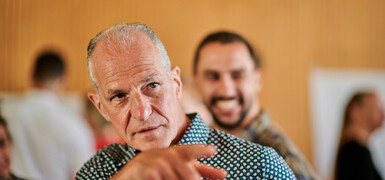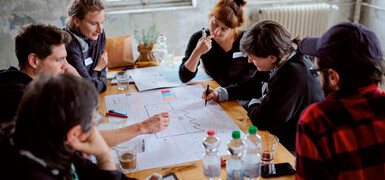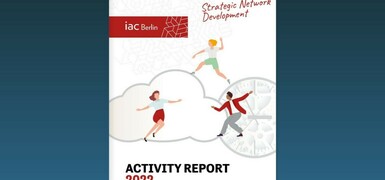
Why should organizations dare to embark on strategic experiments?
Learnings from the strategic setup of ANSTOSS DEMOKRATIE
The English poet William Blake once said, “The true method of knowledge is experiment.” The courage to experiment and diverge from established paths is crucial to innovation, and our need for innovation is urgent. The challenges facing democratic culture today are very complex, and traditional solutions – linear and driven by pre-defined outputs – are utterly inadequate. Designed to meet these challenges head-on, ANSTOSS DEMOKRATIE is a ‘strategic experiment’ aimed at fostering innovation and new forms of collaboration.
Initiated in 2021, ANSTOSS DEMOKRATIE is a strategic experiment to develop and test new ways to collaborate effectively on a systemic level. With the shared goal of strengthening democratic culture in Austria, Germany, and Switzerland, it tears down silos to bring together partners from politics, civil society, media, the private sector, and science.
As part of its initial two-year incubation phase, the partners' focus is on co-designing shared structures and a culture of collaboration. Partners are experimenting with new forms of cooperative governance structures, while gaining first-hand experience with the challenges and dynamics of this kind of collaboration – all of which will help to guide related projects in the future.
Representatives of three of the organizations involved in this strategic experiment share their perspectives, experiences, and lessons learned.

Internationale Bodensee-Hochschule (Schweiz)
The great challenges of our time can only be solved together. Thus, the difficulty – and the solution – lies in developing effective ways to collaborate across borders and sectors. From a strategic point of view, we saw that we needed to create open processes and learning spaces that allow us to challenge assumptions and break down silos. And that is exactly what ANSTOSS DEMOKRATIE does.
We wanted to participate in ANSTOSS DEMOKRATIE, because all of our work is driven by the question of how research can contribute to social innovation, fact-based decision-making in policy and society, and achieving social impact. We can share our perspective with a project that promotes democracy, and we contribute our experiences with transnational governance and cross-border alliances.
Just like foundations, universities face the challenge of how to develop their role as a social protagonist and how to respond to the complexity of today’s challenges. Engaging in strategic experiments, forging new alliances, and learning from other fields could be the way.
Alexandra Hassler
Deputy Managing Director
ERSTE Stiftung (Austria)
We are all affected by the anti-democratic developments in society, and we need new ways to explore and take on these challenges. Through ANSTOSS DEMOKRATIE, we’ve realized that the critical issue is to bring together everyone who wants to protect, strengthen, and, hopefully, enlarge the reach of democratic culture and humane societies.
We are developing ANSTOSS DEMOKRATIE as a strategic experiment, which is rather different from how foundations usually act. Instead of putting out a call for the best solutions, we are bringing together funders, recipient organizations, experts, and NGOs to define the best ways to make all of our efforts more efficient. Developing concrete actions through a collaborative process is definitely an experiment for many of us.
Through this experience, we’ve learned that such processes are not always the easiest way to define and reach strategic goals. Yet, if we want to stay true to our mission and build something that lasts, it needs to be done in a way that is open, inclusive, respectful, and democratic. It is not easy to get people out of their comfort zones, but once they do, new ways of thinking, working, and collaborating all become possible.
There needs to be more willingness to engage in strategic experiments, as our world is changing ever faster and the usual strategies and processes will no longer provide effective solutions. The philanthropic sector in particular, needs to step down from its exalted position of being the benevolent, but somewhat distant funder and enabler. It needs to engage more directly with those in the field. In this respect, I believe our shared efforts to develop ANSTOSS DEMOKRATIE could be a model for how people can come together to support societies in which people can live with dignity, happiness, and freedom.
Franz Karl Prüller
Senior Advisor to the Board
Robert Bosch Stiftung (Germany)
Improving the culture of debate – online and offline – is of utmost importance to democracy, which is one of the reasons why the Robert Bosch Stiftung has long supported projects that promote a constructive culture of discussion. We also believe that trans-sectoral collaboration is crucial to strengthening democracy, and ANSTOSS DEMOKRATIE gives us the opportunity to explore systemic solutions to this issue in the German-speaking countries of Europe.
Compared to our usual funding methods, ANSTOSS DEMOKRATIE is clearly an experiment. Instead of defining exact outcomes at the beginning of the project, we started with a vision and strategic goals. Not having defined outcomes can be challenging, but at the same time, it opens up space for creativity and the freedom to continually modify processes. Also, as part of a cross-sector consortium, we are part of an intensive, two-year, co-creation process with representatives from different sectors involved at almost every step of the way. Not only are we exploring joint solutions, we have also learned that the pivotal challenges to democracy are similar across all three countries, and have gained deeper insights into the specific national contexts.
In a world of constant change, organizations should question their working culture from time to time. Through this experience, we’ve learned and are still learning about great projects, new civil society organizations, and unconventional ways of collaboration and funding.
Elena Jung
Project Manager
Markus Lux
Senior Vice President, Global Issues
About ANSTOSS DEMOKRATIE
ANSTOSS DEMOKRATIE was initiated by the ERSTE Stiftung, the European Forum Alpbach Foundation, the Robert Bosch Stiftung, the Stiftung Mercator Germany, and the Stiftung Mercator Switzerland. For its first two years, the iac Berlin has served as the project’s incubator. The Internationale Bodensee-Hochschule was one of the nine development partners that were supported as part of the incubation phase.
Do you want to find out more about ANSTOSS DEMOKRATIE, its experimental setup and its results? Please do not hesitate to get in touch with:
Vinzenz Himmighofen
Coordinator of ANSTOSS DEMOKRATIE
vinzenz.himmighofen@iac-berlin.org
